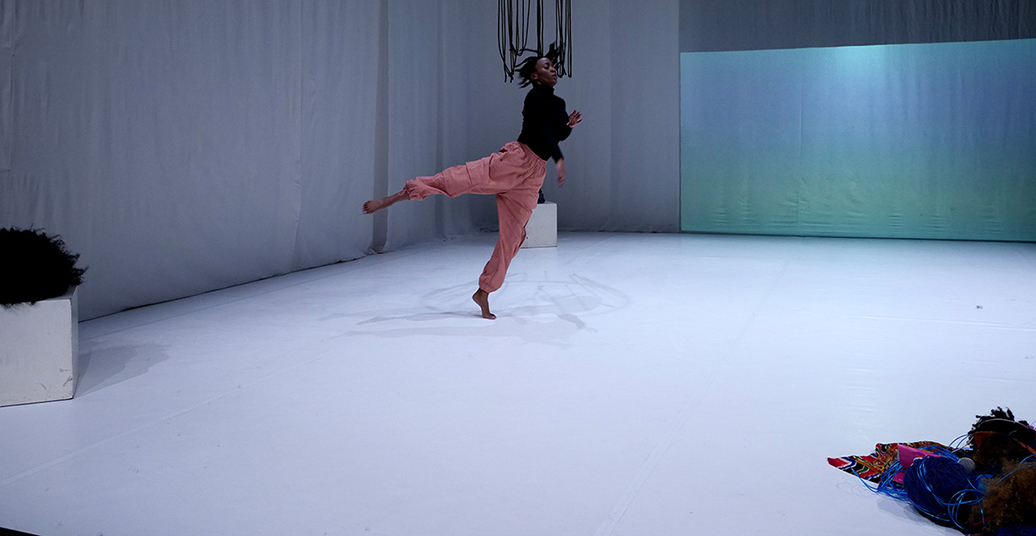Ballhaus Naunynstraße is one of the few (the only?) theatres in Germany that is committed to showing and supporting the perspectives of BIPOC and of those who identify as queer. It offers a strong impulse to development of postcolonial discourse and practices. Here, performance artist Nasheeka Nedsreal presents her first solo performance “New Growth”.
Weaving, braiding, straightening. Wigs, bald, curly. Natural, bundled, afro. Hairdressers, hair products, commercials. Imagery, agency, expectations. Control, power, violence. Hair, women’s hair, Black women’s hair.
“New Growth” is about hair. About Black women’s hair. And also about way more. Before we enter the theatre space, we are asked to sit on little marks made of tape, 1,5 metres apart, in front of a big screen. An eclectic flow of images overlaps and streams past us, offering us different hair styles, hair products, hair commercials, and imagery of hairdressers. It provides a clear focus on the topic of the piece even before we enter. Inside the auditorium itself, a body slowly moves on a diagonal. I see the body is lying on its back, but, at second glance, I notice that the head appears to be facing the floor. It seems to have been placed backwards on the body! Another look, and I realise that Nedsreal is wearing a wig, covering her face. Still on her back, she pushes a bundle of colourful cloth and thread to the corner of the room with her head, then she stands up and dances, the wig covering her whole head.
In an article on the decolonisation of hair and beauty standards[1], writer, academic and educator Kristin Denise Rowe argues that hair practices of Black women are seen through the lens of ‘Eurocentric’ standards of beauty. As a result, the aesthetic hair choices Black women make are often only considered as fitting into a dichotomy — when you decide to have a natural, curly hair style, it’s considered to be a political statement, but when you straighten it, it’s an indication of assimilation to these beauty standards, and therefore potentially a sign of self-hatred. “Within this binary, Black women’s agency, narratives, and experiences are obscured.” Rowe states.
The theatre is warm, and so I feel some relief when Nedsreal takes the wig and the hair net under it off to reveal her sweaty face and her actual hair, in braids, hidden beneath them. She takes her time organising the space, then stands on a chair and ties her hair to even longer braids that are hanging from a ring on the ceiling. She’s ensnared. She raps, and an intriguing word flow on the topic of hair passes us by. “Some of you know what I’m talking about,” she says. Indeed, some of us do. I don’t. I haven’t experienced multiple hair choices, the incapabilities of hairdressers, or the hidden (or not so hidden) manifestations of oppressive beauty standards and racism in relation to my hair.
In this light and short performance (it takes a while before the audience realises it’s over and starts clapping), Nedsreal unravels the complexity of the topic with fierceness and joy. It must be familiar to some in the audience, but for others, like me, it’s an act of knowledge-gathering. She raps, she dances, and on video she multiplies herself and dances with her six alter egos, all wearing different hair styles. From the pile in the corner, she takes a long cloth and wraps it around her head. She goes back into her movement along the diagonal, and then takes out a comb. Again, it seems that I was mistaken; while moving backwards on her sit bones, she untangles her braids and removes them. They are extensions. The hair underneath is short, ready for her to do whatever she wants with it.
[1] https://rcdfashion.wordpress.com/2018/09/17/on-decolonization-beauty-and-black-hair-aesthetics-by-kristin-denise-rowe/
“New Growth” by Nasheeka Nedsreal premiered at Ballhaus Naunynstraße on 8 November, 2019. Next performances: 21+22 October, 2020 at 8pm.




